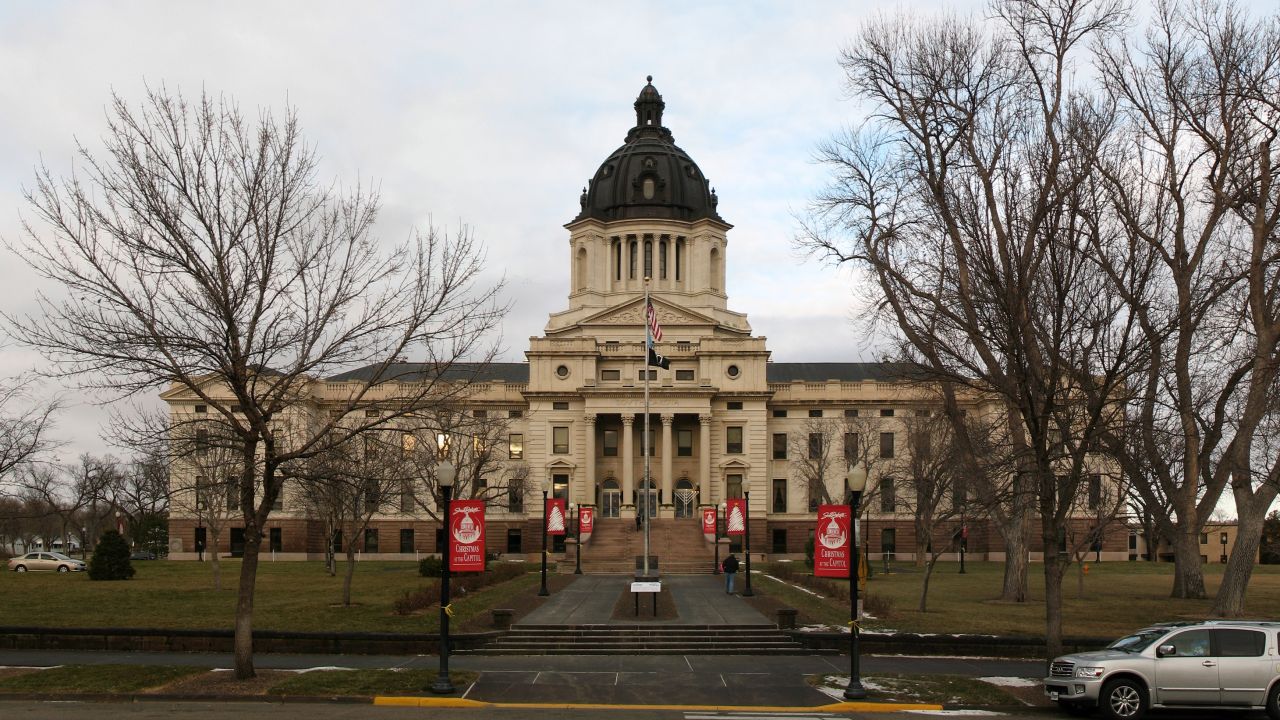
South Dakota Capitol building. (Jake DeGroot/Wikimedia Commons)
We’ll be posting this roundup each week leading up to Election Day. Share your thoughts about these must-read stories and always feel free to suggest your own in the comments section.
THIS WEEK’S TOP STORY
South Dakota voters will have a chance this November to vote on a ballot initiative designed to reduce the power of money, and the special interests who have it, in the state. Measure 22 would lower the cap on how much individuals can give to candidates for state and local office and to the political parties and political action committees that back them. Backed by Represent.Us, a campaign finance reform group with a conspicuously bipartisan board of advisers, the measure would also create a state public financing system, in which every registered voter is given $50 to assign to her or his candidate of choice. The thinking behind measures like this, including a similar one that voters approved last year in Seattle: If money has to be equated with political speech, giving regular voters these $50 “credits” elevates their voices. The measure would also require some politicians to wait two years after leaving office before becoming lobbyists.
But monied interests are already lining up against the law. USA Today reports that the Koch brothers’ Americans for Prosperity is spending big in South Dakota, trying to frame Measure 22 as an attack on free speech. “If it can happen in South Dakota, it can happen in 10 or 20 other states,” Luke Hilgemann, Americans for Prosperity’s national CEO, said of laws like Measure 22.
QUOTE OF THE WEEK
“Paul Singer, I challenge you to come here and have a debate with me … I think the people of the 19th District deserve to hear your actual voice when you’re putting so much money into trying to buy up representation.”
— Zephyr Teachout, Democratic candidate for congress from New York’s 19th District, challenging the hedge fund CEO who is spending to help her Republican rival to a debate.
CAMPAIGN CASH SNAPSHOT
Figures for presidential and congressional races from the Center for Responsive Politics; figures for state races from the National Institute of Money in State Politics. All figures as of Aug. 20.
CHART OF THE WEEK
The expensive fight for the Republican Party nomination saw the emergence of a contingent of groups that poured huge sums into campaigns on behalf of each primary candidate without ostensibly coordinating with those candidates. Those groups have disappeared from the scene now, and been replaced with a new group of big-spending Republican organizations, ready to do general-election battle with their Democratic counterparts. Here are the top 10 super PACs supporting candidates that are still in the race [H/T Center for Responsive Politics for the data]:
Some quick background on the top five: Priorities USA Action supports Hillary Clinton. Get Our Jobs Back was founded by convicted Ponzi schemer Steven Hoffenberg to spend $50 million on behalf of Donald Trump. NextGen Climate Action is backed by Tom Steyer and supports candidates with strong environmental policies. Freedom Partners is the Koch brothers’ umbrella group.
STAT OF THE WEEK
$30,000
Thats the amount that AlternativePAC, a group founded by former FreedomWorks head Matt Kibbe to support Libertarian presidential candidate Gary Johnson, paid for “internet web memes.” [H/t ProPublica’s Derek Willis]
RACE OF THE WEEK
Wyoming, with a population of fewer than 564,000 as of the last census, only gets one vote in the US House of Representatives. The upcoming retirement of Republican incumbent Cynthia Lummis is making way for someone new. And that someone new, in this deep red state (in 2012, Wyoming voters favored Mitt Romney over President Barack Obama by a margin of better than 2 to 1) will have a familiar name. Liz Cheney, daughter of former Vice President Dick Cheney, this week triumphed over a host of challengers in the Republican primary to win the nomination for the seat her father once occupied in Congress. Cheney outraised her closest rival, Tim Stubson, by more than 6 to 1. Of the top 10 companies with employees donating to her primary bid, only one company — Memorial Hospital of Sweetwater County — was based in Wyoming.
DONOR OF THE WEEK
League of Conservation Voters
In a sign that next week’s primary election might be getting a little too close for some Democratic insiders’ comfort, the League of Conservation voters, which backs environment-friendly candidates in tight races, has thrown its support behind Rep. Patrick Murphy (D-FL), who is seeking the Democratic nomination for US Senate in Florida. In making the endorsement, LCV said Murphy would have a better chance than his Democratic primary opponent and US House colleague, Alan Grayson, of beating Sen. Marco Rubio in the general election. The incumbent Republican originally planned to retire after serving a single term, but changed his mind after losing his bid for the Republican presidential nomination. Grayson is a bit of a Democratic version of Donald Trump: an unpredictable but always riveting orator who excites the party base but who might turn off swing voters. Whichever Democrat faces Rubio will need all the money he can get — Republican donors, including many who are less than enthusiastic about Trump, are mobilizing to defend Republicans’ hold on the Senate, with Mitt Romney helping to mobilize them.
SOCIAL ENGAGEMENT OF THE WEEK
For a contribution of $100,000, a couple can attend a fundraiser hosted on Martha’s Vineyard this weekend by Lady Lynn Forester de Rothschild, a member of the wealthy Rothschild family that, among other investments, owns The Economist magazine. Rothschild is a longtime supporter of Hillary Clinton, and supported her vigorously during the 2008 campaign. When Clinton didn’t win the nomination, Rothschild, instead of supporting Obama, threw her support behind John McCain.
MUST-READS FROM HERE AND ELSEWHERE
- Clinton Super-PAC Going Dark in Colorado and Pennsylvania, by Kendall Breitman, Bloomberg
- Obama facing pressure to rip up his lobbyist rules, by Sarah Wheaton, Politico
- Stark New Evidence on How Money Shapes America’s Elections, by Lynn Stuart Parramore, AlterNet




